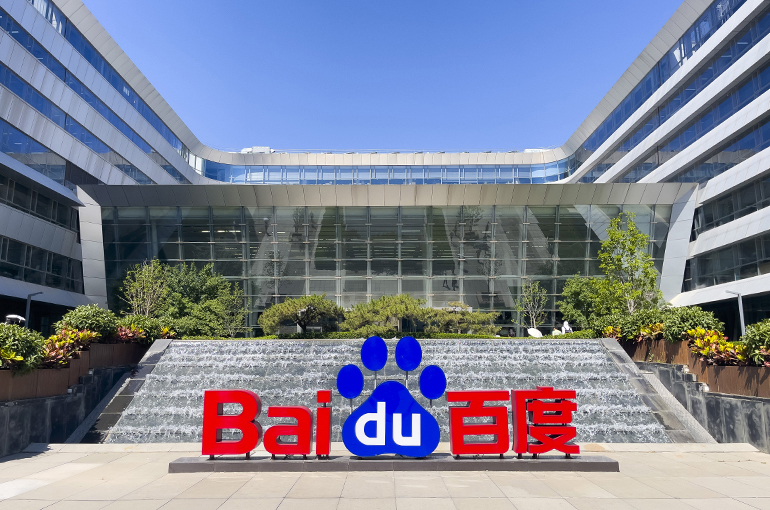 Baidu Drops Despite 42% Jump in First-Quarter Profit on AI, Robotaxis
Baidu Drops Despite 42% Jump in First-Quarter Profit on AI, Robotaxis(Yicai) May 22 -- Baidu's shares fell despite the Chinese tech giant reporting a 42 percent jump in first-quarter profit, buoyed by breakthroughs in artificial intelligence and autonomous driving.
Baidu [HKG: 9888] closed 4 percent lower at HKD82.65 (USD10.56) a share in Hong Kong today. Its New York-listed stock [NASDAQ: BIDU] sank 4.3 percent yesterday to finish at USD85.48.
Net profit was CNY7.7 billion (USD1.1 billion) in the three months ended March 31, the Beijing-based company said in a financial report released yesterday. Revenue rose 3 percent to CNY32.5 billion (USD4.5 billion).
Revenue growth was relatively modest compared with Tencent Holdings, Alibaba Group Holding, and JD.Com, according to analysts. First-quarter revenue at those three Chinese internet behemoth’s climbed 13 percent, 7 percent, and 16 percent, respectively.
Net profit at Baidu Core, the firm’s main segment that includes internet services and AI-driven products and services, jumped 48 percent to CNY7.6 billion. Revenue rose 7 percent to CNY25.5 billion, of which online marketing income fell 6.4 percent to CNY16 billion, and non-online marketing income soared 40 percent to CNY9.4 billion.
Baidu Core’s revenue growth was “driven by the accelerating momentum of AI Cloud," co-founder and Chief Executive Robin Li said. "We are confident that our AI-first strategy positions us to remain at the forefront and to capture long-term growth opportunities in the AI era."
AI Push
Baidu AI Cloud Group generated CNY6.7 billion in revenue, a 42 percent increase on a year earlier, according to data released by Baidu during its earnings conference call. AI Cloud accounted for 26 percent of Baidu Core's total revenue in the period, up from 20 percent.
AI Cloud's operating margin based on non-generally accepted accounting principles has reached the “teens level,” Shen Dou, Baidu executive vice president and president of AI Cloud, said on the call.
In March, Baidu released Ernie 4.5, the company’s first multimodal foundation model, and Ernie X1, its first reasoning model. The enhanced Turbo versions of the two, which were launched last month, deliver improved performance at much lower prices, addressing market demand for cost-effective AI solutions.
Baidu's search transformation is also accelerating, with AI-generated content now accounting for 35 percent of mobile search results in April, up from 22 percent in January. This rapid growth reflects improving model capabilities and user experience, with AI-exposed users showing stronger retention and query exploration patterns.
"We have established a solid product framework that incorporates multimedia content, helping provide more digestible answers that align with user behavior," Shen noted.
"We follow an application-driven approach because we believe the greatest value of AI eventually lies at the application layer," Shen said on the issue AI chip export restrictions. "Even without access to the most advanced chips, our unique full-stack AI capabilities enable us to build strong applications and deliver meaningful value."
Robotaxi Expansion
Baidu's autonomous driving business completed its first overseas expansion in March, with Apollo Go entering the Dubai and Abu Dhabi markets. This month, the self-driving tech unit commenced open-road testing in Dubai and secured approval for designated passenger trials in Hong Kong, its first right-hand drive market.
Apollo Go provided over 1.4 million rides in the first quarter, up 75 percent from a year earlier, underscoring the accelerating momentum of its scaled operations. As of May, it had provided a total of more than 11 million rides.
Apollo Go has deployed over 1,000 fully driverless vehicles across 15 cities globally, with 100 percent autonomous operations achieved in the Chinese mainland.
"We see a clear path to profitability as hardware and labor costs continue declining and our growing operational scale brings more efficiencies," Li said, positioning Apollo Go as a key long-term growth driver.
Apollo Go recently partnered with CAR, a leading Chinese car rental firm, to introduce fully autonomous rental vehicles.
Despite Baidu's heavy investment in AI and Ernie bot's leading position among large language models, commercializing AI takes time. While AI Cloud margins are expanding and robotaxi operations show promising results, questions remain about the timeline for meaningful profitability contribution.
Editor: Futura Costaglione